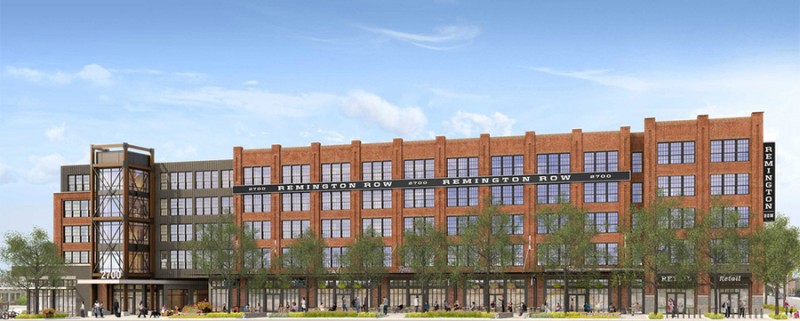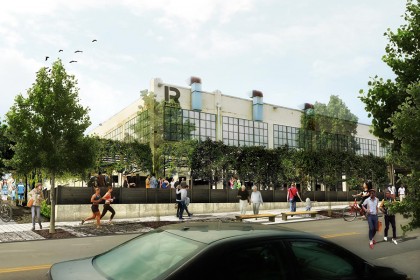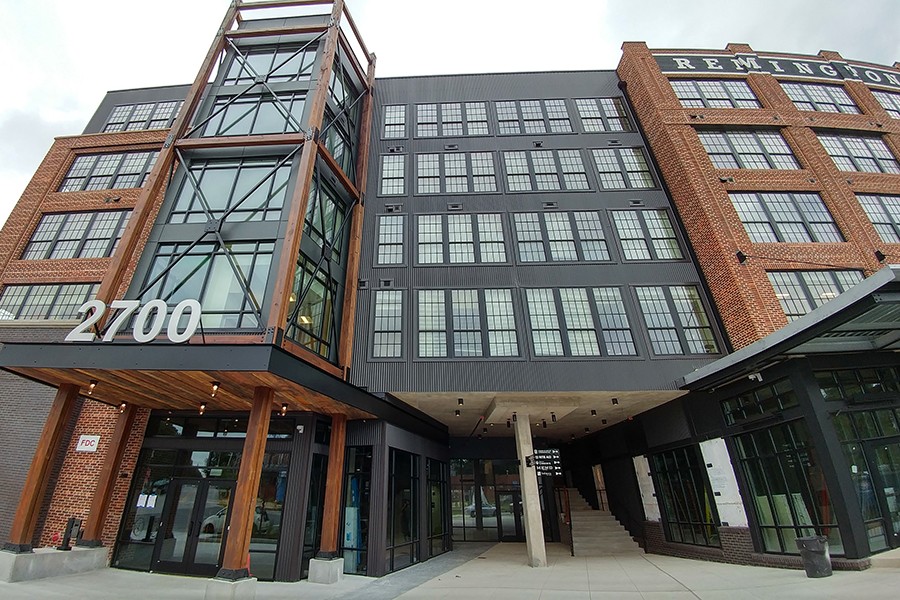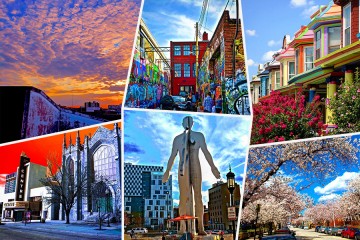On what was once a vacant lot, a brick building with sweeping windows now stands. Residents carry bikes in the front door, heading off to study, cook, or relax in airy apartments. Patients arrive to see doctors in an innovative and personalized setting. Shoppers drop off prescriptions, or pick up a bottle of shampoo. And, in a few weeks, people will come for acupuncture treatment and hair appointments.
The building, Remington Row, formally opened this month in Remington, the diverse Baltimore neighborhood that brushes the southern edge of Johns Hopkins University's Homewood campus. Although the building's high windows and ornate brickwork evoke a repurposed factory, Remington Row was built from the ground up by local developers Seawall Development in collaboration with Hopkins.
Also see
"We really pride ourselves on building things from the inside out," said Thibault Manekin, who co-founded Seawall with his father, Donald Manekin, in 2007. Seawall conceived of the project after community leaders sought to revitalize three blocks of largely vacant land along Remington Avenue between 27th and 29th streets.
Remington, historically a mix of brick rowhomes and industrial businesses, has been undergoing a renaissance in recent years. Seawall has built two other projects that have brought new energy to the neighborhood. Miller's Court is an old Howard Street tin can factory turned into airy apartments for teachers and non-profit offices. On the opposite side of Howard Street, Seawall turned a former tire shop into the hip Parts & Labor restaurant and Single Carrot Theater.

Image caption: An artist's rendering of the exterior of Remington Row
Image credit: Hord Coplan Macht Architects and Seawall Development Company
The area is one of several highlighted by the recently launched "Explore the Core" campaign, an effort to call attention to the vibrant and culturally diverse neighborhoods of Central Baltimore.
Remington Row brings some long sought amenities to the neighborhood: Physicians specializing in children, women's health, and internal medicine; a drug store; and 108 stylish but affordable apartments. Rents range from $1,175 to $1,800 for a one-bedroom apartment, significantly less than comparable apartments in other parts of the city. A diverse group of people—Hopkins students and faculty, families with small children, young professionals, and empty nesters—have already moved in, Manekin said.
"Remington Row came out of Greater Remington Improvement Association's master plan," said Ellen Janes, executive director of the Central Baltimore Partnership, an organization that promotes neighborhoods in the city's core. "These two blocks were pretty blighted and non-contributing, but now they're shaping up to be the town center."
The second floor of the building is devoted to three Johns Hopkins Community Physicians practices that moved from dated offices in the Wyman building adjacent to the Homewood campus. The move not only allows the practices to update their facilities, but also to experiment with a new model of patient-centered care, said Steven Kravet, president of Johns Hopkins Community Physicians.
"We wanted to balance the ability to develop a practice that was innovative with our commitment to caring for the community," Kravet said.
When patients arrive at the offices, they will be escorted to a private waiting and exam room. There, they will be met by a receptionist, medical technician, nurse and physician. That means patients will no longer have to share a waiting room with others—no more sharing a sofa with a coughing fellow patient during flu season. Behind the scenes, practitioners and support staff will work in close collaboration.
"The engine of the practice is in the backstage area," Kravet said. "The team is all seated together, with more proximity for the doctors, nurses, and administrators to work together. It's more team-centered."

Image caption: Seawall Development is working to turn a former auto shop on Remington Avenue into a 50,000-square-foot food hall called R. House.
Image credit: PI.KL Studio
A large Rite Aid store has already opened on the first floor of Remington Row, filling a void in a community with few retail options. Several other established businesses are slated to move in later this fall, including Mend Community Acupuncture, which is currently in Hampden; and Balance the Salon, which is in Roland Park. A small dry cleaner is also set to open, Manekin said.
Further down Remington Avenue, the Manekins are working to turn a former auto shop into a 50,000-square-foot food hall called R. House. Chefs specializing in Venezuelan arepas, Korean barbecue, rustic vegetarian food, and Mediterranean street food, among others, will have stands in the hall when it opens late this year. The upper floor of that building will contain dance, yoga, and movement studios, Manekin said. And a third, smaller building is set to open early next year with a bike shop and other retail spaces.
"Hopkins doesn't have a student center, so it's important to diversify the amenities around the campus," said Andrew B. Frank, JHU's special advisor to the president on economic development.
Remington is one of the 10 neighborhoods covered by the Homewood Community Partners Initiative, a university effort to bolster communities near the JHU's Homewood campus. The HCPI team worked closely with residents in each of the neighborhoods to come up with ways the university could aid the community, such as improving schools and public spaces.
"Remington is involved in all of those things," Frank said. "And it's become a great place to live as well."
Posted in University News, Community









